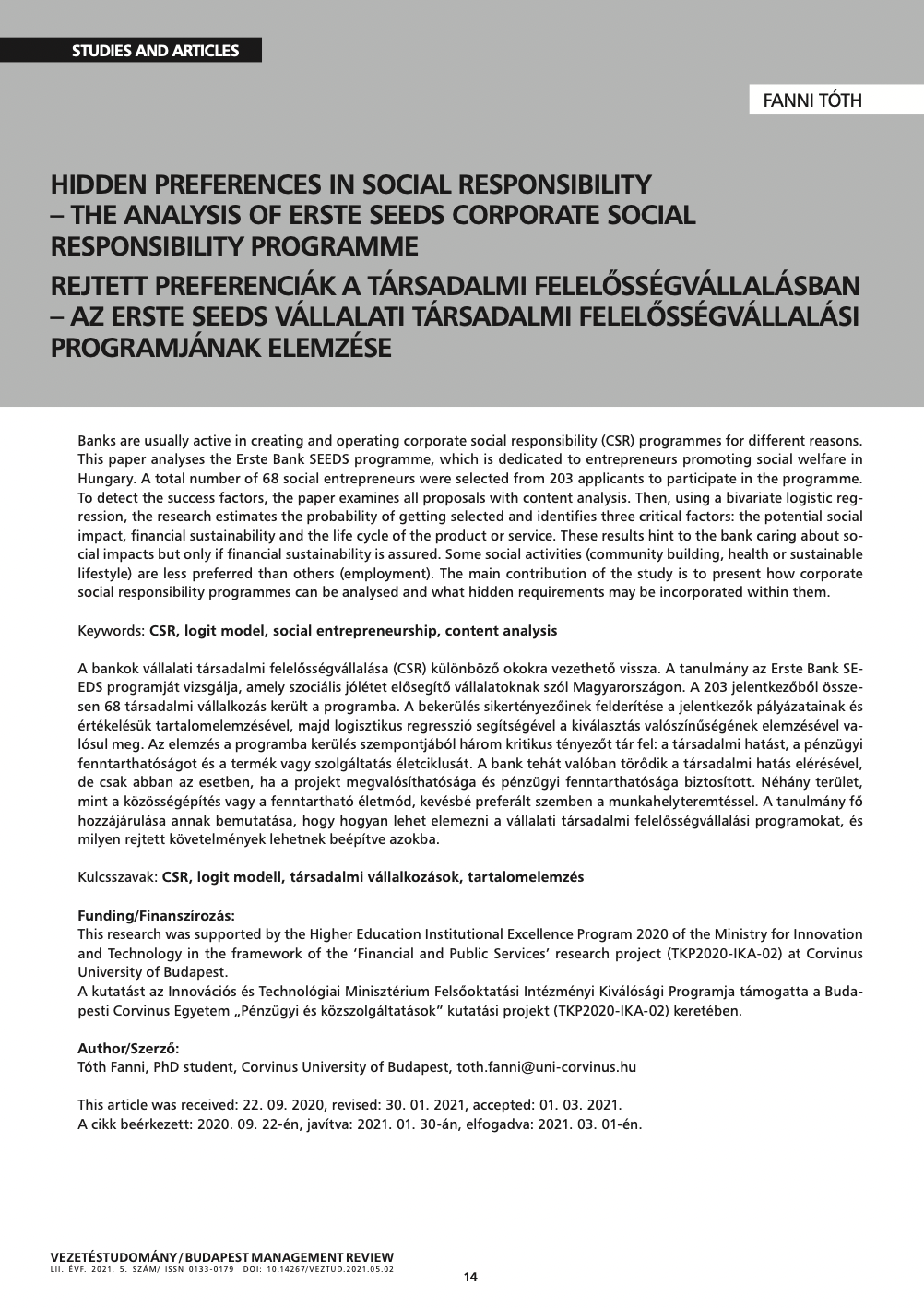Hidden preferences in social responsibility
The analysis of Erste SEEDS corporate social responsibility programme
DOI:
https://doi.org/10.14267/VEZTUD.2021.05.02Keywords:
CSR, logit model, social entrepreneurship, content analysisAbstract
Banks are usually active in creating and operating corporate social responsibility (CSR) programmes for different reasons. This paper analyses the Erste Bank SEEDS programme, which is dedicated to entrepreneurs promoting social welfare in Hungary. A total number of 68 social entrepreneurs were selected from 203 applicants to participate in the programme. To detect the success factors, the paper examines all proposals with content analysis. Then, using a bivariate logistic regression, the research estimates the probability of getting selected and identifies three critical factors: the potential social impact, financial sustainability and the life cycle of the product or service. These results hint to the bank caring about social impacts but only if financial sustainability is assured. Some social activities (community building, health or sustainable lifestyle) are less preferred than others (employment). The main contribution of the study is to present how corporate social responsibility programmes can be analysed and what hidden requirements may be incorporated within them.
Downloads
References
Erste Bank Hungary Ltd. (2017a, September 29.). Development status. [PowerPoint slides].
Erste Bank Hungary Ltd. (2017b). Összes beérkezett és bírált pályázó. [Data file and code book].
Erste Bank Hungary Ltd. (2018, June 8). Záró ünnepség, Erste SEEDS program. [PowerPoint slides].
Erste SEEDS. (2020). Erste SEEDS Program. Retrieved from https://kampany.erstebank.hu/extras/ersteseeds/index.html
European Commission (2012). Comparative study of the project selection applied in cohesion policy programmes 2007-2013 in a number of member states. Final report. European Commission, Directorate General for Regional Policy. Retrieved from https://ec.europa.eu/regional_policy/sources/docgener/studies/pdf/selection/selection_process.pdf
European Commission (2015). Proposals submission and evaluation (sections III.5, III.6, IV.1, IV.2). Grants manual. Version 1.4. European Commission, Directorate General for Research & Innovation. Retrieved from https://ec.europa.eu/research/participants/data/ref/h2020/grants_manual/pse/h2020-guide-pse_en.pdf
Gangi, F., Meles, A., D’Angelo, E., & Daniele, L. M. (2019). Sustainable development and corporate governance in the financial system: Are environmentally friendly banks less risky? Corporate Social Responsibility and Environmental Management, 26(3), 529–547. https://doi.org/10.1002/csr.1699
Hámori, G. (2016). A magyarázóváltozók kezelésének egyes kérdései regressziós modellezés során. Statisztikai Szemle, 94(1), 5–21. https://doi.org/10.20311/stat2016.01.hu0005
Hosmer, D. W., & Lemeshow, S. (2000). Applied Logistic Regression: Hosmer/Applied Logistic Regression. John Wiley & Sons, Inc. https://doi.org/10.1002/0471722146
Hsieh, H.-F., & Shannon, S. E. (2005). Three Approaches to Qualitative Content Analysis. Qualitative Health Research, 15(9), 1277–1288. https://doi.org/10.1177/1049732305276687
Interreg IPA (2019). Evaluation of the efficiency and effectiveness of the Interreg IPA CBC Programme Croatia - Serbia 2014 – 2020, Final evaluation report. Retrieved from https://www.interreg-croatia-serbia2014-2020.eu/wp-content/uploads/2019/11/Evaluation-report_HR-RS.pdf
Liang, L.-W., Chang, H.-Y., & Shao, H.-L. (2018). Does sustainability make banks more cost efficient? Global Finance Journal, 38, 13–23. https://doi.org/10.1016/j.gfj.2018.04.005
Miralles‐Quirós, M. M., Miralles‐Quirós, J. L., & Redondo‐Hernández, J. (2019). The impact of environmental, social, and governance performance on stock prices: Evidence from the banking industry. Corporate Social Responsibility and Environmental Management, csr.1759. https://doi.org/10.1002/csr.1759
IFKA NKft. (2020, January 24). Társadalmi vállalkozások monitoring/minősítő rendszere. [PowerPoint slides].
Weber, R. (1990). Basic Content Analysis. SAGE Publications, Inc. https://doi.org/10.4135/9781412983488
Wu, M.-W., & Shen, C.-H. (2013). Corporate social responsibility in the banking industry: Motives and financial performance. Journal of Banking & Finance, 37(9), 3529–3547. https://doi.org/10.1016/j.jbankfin.2013.04.023
Zhang, Y., & Wildemuth B. M. (2005). Qualitative analysis of content. 1-12. Retrieved from https://www.ischool.utexas.edu/~yanz/Content_analysis.pdf

Downloads
Published
How to Cite
Issue
Section
License
Copyright (c) 2021 Vezetéstudomány / Budapest Management Review

This work is licensed under a Creative Commons Attribution 4.0 International License.
Authors assign copyright to Vezetéstudomány / Budapest Management Review. Authors are responsible for permission to reproduce copyright material from other sources.

